
views
New Delhi: The Supreme Court on Monday said it would set up a fresh Constitution Bench to examine the validity of various aspects of a provision of the Citizenship Act 1955, including the cut-off date for awarding citizenship to Bangladeshi immigrants in Assam.
The matter came up before a bench comprising Chief Justice Dipak Misra and Justices A M Khanwilkar, and D Y Chandrachud, which said, "We will set up a Constitution bench in the matter."
A five-judge bench of the apex court in April last year had said it would deal with 13 questions related to the constitutional validity of section 6A of the Act, which were referred to it for consideration by a two-judge bench in December 2014.
Section 6A of the Act relates to special provisions for citizenship of people covered by the Assam Accord, which was a memorandum of settlement signed between representatives of the Centre and the leaders of Assam movement in August 1985.
The bench had said that apart from these 13 questions, it might also deal with related issues raised by the parties, if required.
In December 2014, a two-judge bench of the apex court had framed 13 questions, for deliberation by a larger bench, which included as to whether section 6A violates the Articles of the Constitution by diluting the political rights of citizens of Assam.
It had also framed a question about the scope of fundamental right contained in Article 29(1), relating to the right to conserve a distinct language, script or culture, and also about the meaning of expressions 'culture' and 'conserve'.
The two-judge bench had formulated questions whether section 6A of the Citizenship Act 1955 violates Article 14 (equality before law) and Article 21 (right to life) of the Constitution.
"Whether section 6A violates the basic premise of the Constitution and the Citizenship Act in that it permits citizens who have allegedly not lost their citizenship of East Pakistan (now Bangladesh) to become deemed citizens of India, thereby conferring dual citizenship to such persons," it had said.
The two-judge bench, which was hearing various petitions arising out of its judgement on PILs on influx of illegal Bangladeshi migrants to Assam, had decided to keep monitoring the implementation of directions given by it earlier.
It had earlier passed a slew of directions, including an order to the Centre to complete the fencing work along the India-Bangladesh border within three months to check cross- border influx of illegal Bangladesh nationals into Assam and streamline the process to deport them back.
The apex court had also laid down a time-table for updating the National Register of Citizens (NRC) in Assam so that the entire updated register is published by the end of January, 2016.
The apex court's December 2014 verdict had come on the pleas of Assam Sanmilita Mahasangha, Assam Public Works and All Assam Ahom Association filed in the aftermath of large- scale riots in 2012 and 2014 resulting in the death of a large number of people.
In their writ petition, the petitioners had said the sovereignty and integrity of India is itself at stake as a massive influx of illegal immigrants from a neighbouring country has affected the core constitutional value.


















Comments
0 comment